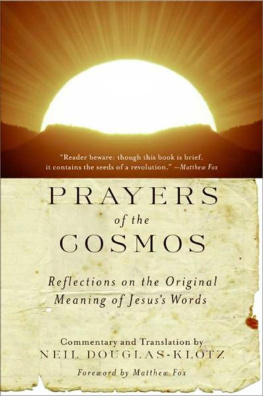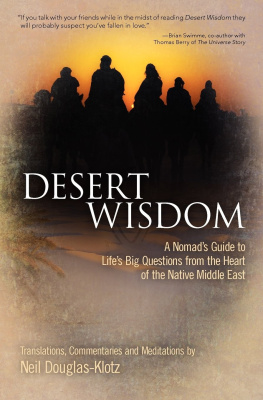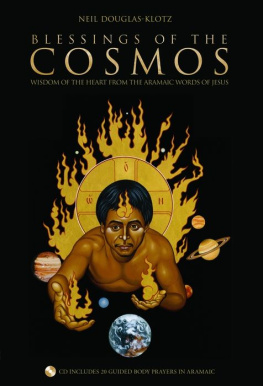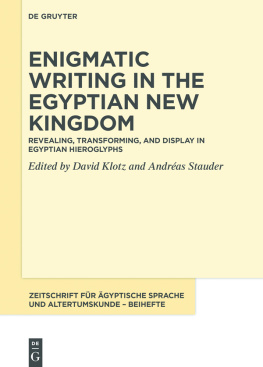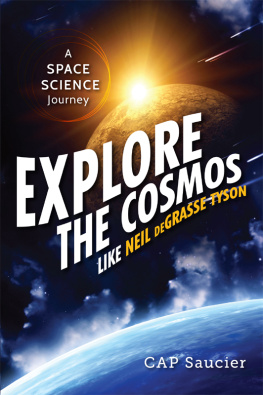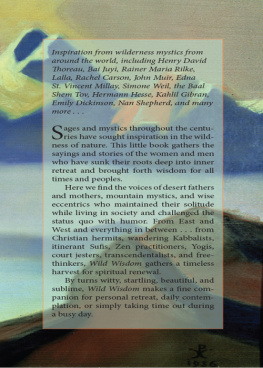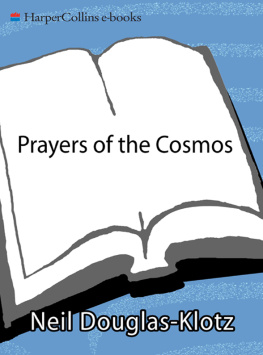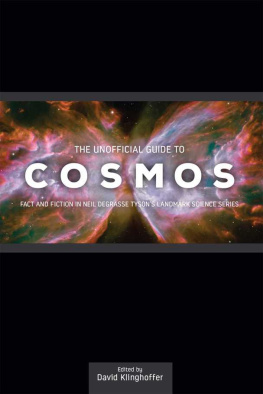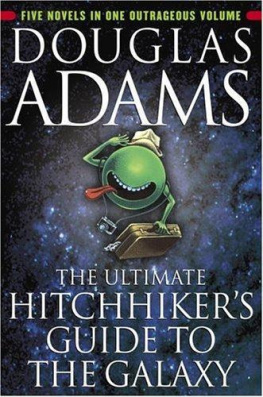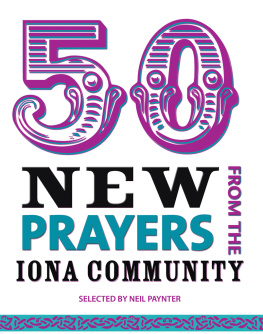Neil Douglas-Klotz - Prayers of the Cosmos
Here you can read online Neil Douglas-Klotz - Prayers of the Cosmos full text of the book (entire story) in english for free. Download pdf and epub, get meaning, cover and reviews about this ebook. year: 2010, publisher: HarperOne, genre: Religion. Description of the work, (preface) as well as reviews are available. Best literature library LitArk.com created for fans of good reading and offers a wide selection of genres:
Romance novel
Science fiction
Adventure
Detective
Science
History
Home and family
Prose
Art
Politics
Computer
Non-fiction
Religion
Business
Children
Humor
Choose a favorite category and find really read worthwhile books. Enjoy immersion in the world of imagination, feel the emotions of the characters or learn something new for yourself, make an fascinating discovery.
- Book:Prayers of the Cosmos
- Author:
- Publisher:HarperOne
- Genre:
- Year:2010
- Rating:4 / 5
- Favourites:Add to favourites
- Your mark:
- 80
- 1
- 2
- 3
- 4
- 5
Prayers of the Cosmos: summary, description and annotation
We offer to read an annotation, description, summary or preface (depends on what the author of the book "Prayers of the Cosmos" wrote himself). If you haven't found the necessary information about the book — write in the comments, we will try to find it.
Prayers of the Cosmos — read online for free the complete book (whole text) full work
Below is the text of the book, divided by pages. System saving the place of the last page read, allows you to conveniently read the book "Prayers of the Cosmos" online for free, without having to search again every time where you left off. Put a bookmark, and you can go to the page where you finished reading at any time.
Font size:
Interval:
Bookmark:

Neil Douglas-Klotz
Foreword by Matthew Fox

For Kamae, who teaches me to persevere.
Blessed are those who plant peace each season.
Reader beware: though this book is brief, it contains the seeds of a revolution.
Those who understand what is at stake in a paradigm shift will immediately grasp the power in this little book. A paradigm shift requires a new pair of glasses by which to look anew at our inherited treasures. Just as all translations of our mystics are affected by the ideology or worldview of the translator, so the same is true of the translations of our Scriptures. Those who have lost a cosmology and the mysticism that accompanies it hardly recognize that fact when they translate the Bible for us.
Yet Scripture, as the monks of old who chanted it daily have attested, must be experienced with the heart and not just studied with the head. So much biblical training in our times tests young scholars for the latter but does little to foster the former. Mysticismbanished from our academic life for three centuriesrarely emerges on the printed page of translators who become steeped in the words but not necessarily the music of the authors spirit and intention. When scriptural passages become overly familiar, matters of rote, memorized prayers instead of living words, religion is paralyzed and loses its capacity for transformation. Scripture then becomes the property of specialists.
How disturbing and refreshing, therefore, is this effort by Neil Douglas-Klotz to recover the original language, the native Middle Eastern language, the Aramaic that Jesus spoke! How much expanded heart consciousness and prophetic juice might result from hearing, for example, that what we have translated as be you perfect really means be you all-embracing, or that to be satisfied means to be surrounded by fruit; that blessed are the meek, for they shall inherit the earth also means soften whats rigid inside and you shall receive physical vigor and strength from the universe; that blessed are the pure in heart means blessed are those whose passion is electrified by deep, abiding purpose; that heaven in Aramaic means, in fact, the universe; and that the overly familiar words lead us not into temptation can be translated in this way: Dont let surface things delude us, but free us from what holds us back. Can we get any more cosmological than that? Do the words of Jesus not take on new life and vigor in this version of his saying?
Douglas-Klotzs translations also reveal how feminist Jesus was. Consider that the word Jesus uses, which we have traditionally translated as kingdom, is related to the word for the Great Mother in the Middle East; the word we translate as daily bread means nourishment of all kinds and derives from roots for the divine feminine and for Holy Wisdom, or Sophia.
Prayers of fhe Cosmos is sot t aboo kbout mysticism in the eible. It is a practical meditation that can draw the mystic out of the reader once again, just as the mystic who heard the startling words of Jesus two thousand years ago was drawn out. This is a book that allows us to experience the Scriptures once again through the heart, which means through the body, which means on earth, the source and origin of our bodies. Douglas-Klotzs dedication to bringing the mystic out of self and others through the Dances of Universal Peace is highlighted in the practical and bodily prayer forms that he recommends for recovering the living, breathing Scriptures. He teaches us truly to pray the Scriptures anew, to understand prayer as more than reading or talking. If Hildegard of Bingen was correct eight centuries ago in defining prayer as breathing in and breathing out the one breath of the universe, then Douglas-Klotz is also correct in insisting that we dancethat is, breathethe Scriptures anew.
Douglas-Klotzs version of the Lords Prayer is like a commentary in itself. For centuries theologians have offered us commentaries on this prayer of Jesus, but this one is like no other. It embraces, grounds, challenges. It opens our hearts to cosmology once againas Jesus was open to cosmology and as all native persons are. It allows the mysticism of our scriptural heritage to move us once again, maybe even to transform us.
I welcome this book and the rich fruit it is sure to bear.
M ATTHEW FOX , F OUNDING D IRECTOR
I NSTITUTE OF C ULTURE AND C REATION S PIRITUALITY
The richness of expression present in the native Aramaic language of Jesus is a treasure that has been lostor limited only to scholarsfor too long. To discover this treasure, we must challenge ourselves to participate in the prophetic and mystical tradition that Jesus has represented. It is a far cry from our ordinary way of thinking.
A tradition of both native Middle Eastern and Hebraic mysticism says that each statement of sacred teaching must be examined from at least three points of view: the intellectual, the metaphorical, and the universal (or mystical). From the first viewpoint, we consider the face value of the words in questionwhat so-called modern people normally call the literal meaning. According to native Middle Eastern mysticism, however, each Aramaic word presents several possible literal translations. Blessed are the meek, for they shall inherit the earth could as easily be translated Blessed are the gentle or Blessed are those who have softened the rigidity within. The word for earth in Aramaic also carries the meanings of earth-iness, the natural abundance of nature, and everything that appears in particular forms. To understand how all these relate to one another, we must go further.
From the second viewpoint, we consider how a statement or story presents a metaphor for our lives-or the life of a community. Here we must awaken our poetic sensibility: we must participate in re-creating meaning from several possible literal translations. With reference to the above saying of Jesus, where are the rigid places in our livesor in the life of our society? How do they prevent us from receiving sustenance from the natural abundance of nature?
From the third viewpoint, the universal or mystical, one comes to a truth of the experience pointed to by a particular statement. Here we must go beyond seeing a prayer as an affirmation or petition, or a parable as mere metaphor. We must embrace the wordless experience to which the living words of a mystic point. To continue the above example: one faces the question, What do the words rigid and soft have to do with my experience of life, of the cosmos, of God? What feelings do the sounds of the key words in Aramaic evoke? How do I act responsibly from this new understanding? There are no set answers to these questions: they challenge us to an individual response.
To a native Middle Eastern mystic like Jesus, none of these viewpoints excludes the others. One holds all the possible meanings of key sacred phrases and prayer and lets them work inside. According to the Hebrew sage and language scholar Fabre DOlivet (1815) in The Hebraic Tongue Restored, the tragedy of biblical translation has been that expressions meant to resonate many levels of meaningat least the intellectual, metaphorical, and universalhave been whittled down to become wholly gross in [their] nature restricted to material and particular expressions. This tendency to divide and overliteralize was reflected in the whole Newtonian era: a period that repressed mystical cosmology was also ill at ease with mystical translation. An unnatural division between God, Nature and humanity, unknown to people who lived close to the earth, crept into our language with the advent of modern civilization.
Font size:
Interval:
Bookmark:
Similar books «Prayers of the Cosmos»
Look at similar books to Prayers of the Cosmos. We have selected literature similar in name and meaning in the hope of providing readers with more options to find new, interesting, not yet read works.
Discussion, reviews of the book Prayers of the Cosmos and just readers' own opinions. Leave your comments, write what you think about the work, its meaning or the main characters. Specify what exactly you liked and what you didn't like, and why you think so.

